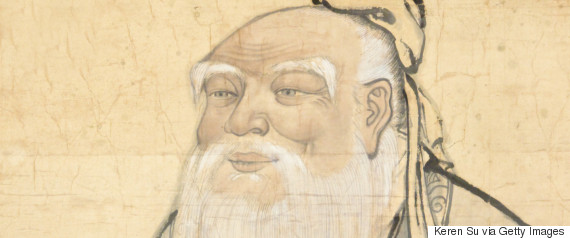
Confucius, China's greatest sage, developed his world-changing philosophy 2,300 years before the birth of the United States. His teachings, though, are remarkably relevant to the debates currently raging in Washington.
And remarkably Republican.
What a surprise, many of you are probably thinking, that GOP conservatives share a lot in common with a crotchety reactionary born in the sixth century BC. The truth, however, is that Confucius explored many of the same political and social issues our policymakers struggle with today -- such as the proper role of government in society, how to ensure national prosperity, and the line between personal and public responsibility. And many of Confucius's views on these contentious subjects would make any Tea Partier proud.
"Confucius explored many of the same political and social issues our policymakers struggle with today -- such as the proper role of government in society, how to ensure national prosperity, and the line between personal and public responsibility."
That's because Confucius was an early advocate of laissez faire economics. To him, good government was small government. Confucius believed that states that imposed high taxes, wasted money in grand schemes or intervened too intrusively in the economy deprived the common man of the fruits of his labor and damaged overall prosperity. In the Analects, the ancient text that best encapsulates his doctrine, Confucius says that to govern a state, there must be "economy in expenditure, and love for men;" When one of his former students, then in the employ of a rich noble family, imposed a land tax over Confucius's objections, the sage groused: "He is no disciple of mine."
Confucius was also a big proponent of another Republican favorite: "family values." For him, the perfect society was built from the ground up - on a solid foundation of strong families. The key to a good Confucian family was the concept of filial piety, which meant children were to be obedient to and supportive of their parents throughout their lives. When filial piety was practiced, "the people were brought to live in peace and harmony," Confucius is quoted saying in one ancient text.
Today's Republicans and Confucius agree on the importance of personal responsibility as well. During his own life, Confucius did not benefit from special privileges or wealth, but instead tried to make his way in the world on his education and perseverance -- and he expected everyone to do the same. When something goes badly, you're not supposed to blame others or rage against the unfairness of society, but look first to yourself, to see what you might have done wrong. "When you meet someone better than yourself," Confucius once said, "turn your thoughts to becoming his equal. When you meet someone not as good as you are, look within and examine your own self."
However, there is at least one commonality between Confucius and the Republicans that they would be better off without: Both have trouble with women. In recent elections, more women have voted Democrat, and if Confucius stood for office today, he probably wouldn't win the female nod, either. He suggested in the Analects that women should be limited to a subordinate position to men in society. "Women and servants are most difficult to nurture," he notoriously said in the Analects. "If one is close to them, they lose their reserve, while if one is distant, they feel resentful." Can't you imagine a foot-in-mouth Republican saying something uncomfortably similar?
"Still, on some issues, even Confucius was more progressive than the GOP. Confucius believed it was the responsibility of policymakers to ensure wealth was spread out among the masses."
Still, on some issues, even Confucius was more progressive than the GOP. Confucius believed it was the responsibility of policymakers to ensure wealth was spread out among the masses. Once when a companion asked Confucius what should be done for the people of an especially populous region, he simply responded: "Enrich them!" In fact, Confucius saw people who were too focused on accumulating riches as ethically suspect. "The gentleman understands what is moral," Confucius said. "The small man understands what is profitable."
That spirit led later Confucians to distrust big business and agitate for the redistribution of wealth. In the second century BC, one prominent Confucian warned the emperor that an excessive concentration of land ownership among a rich few was impoverishing the ordinary man. "The poor were left without enough land to stick the point of an awl into," he complained. "How could the common people escape oppression?" The Confucians were proponents of policies to eliminate income inequality, such as land equalization, and welfare schemes to aid those in need. Mencius, the most influential Confucian thinker after Confucius himself, once scolded a king that if he didn't release food stored in his granaries when his people were starving, he was in effect guilty of murder, as if he had knifed them to death.
A Republican Party that opposes minimum wage increases and food stamps would probably condemn such Confucian ideals as socialist. Perhaps, though, it would improve the Republicans' electoral prospects by becoming even more like Confucius.
Michael Schuman is the author of Confucius and the World He Created.